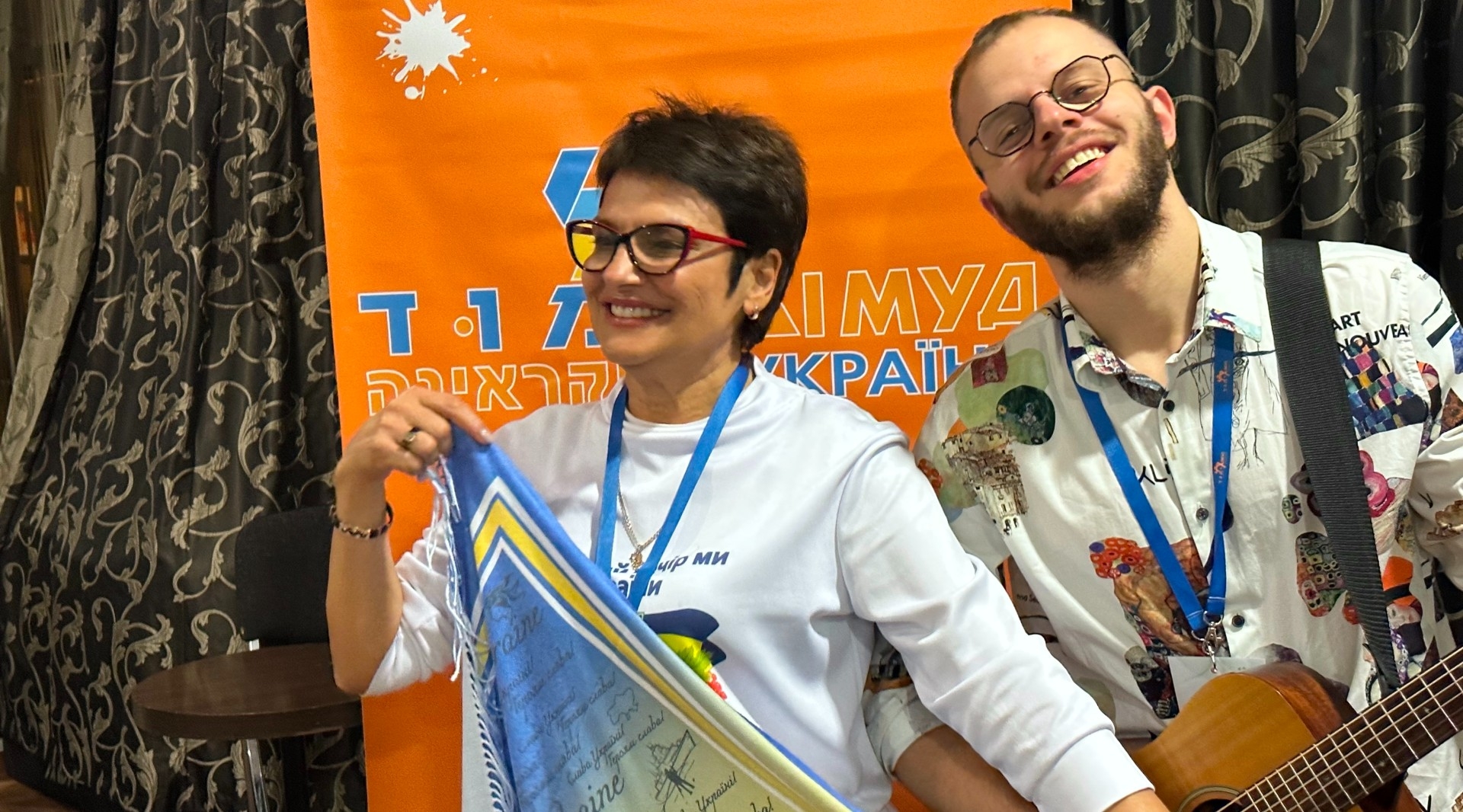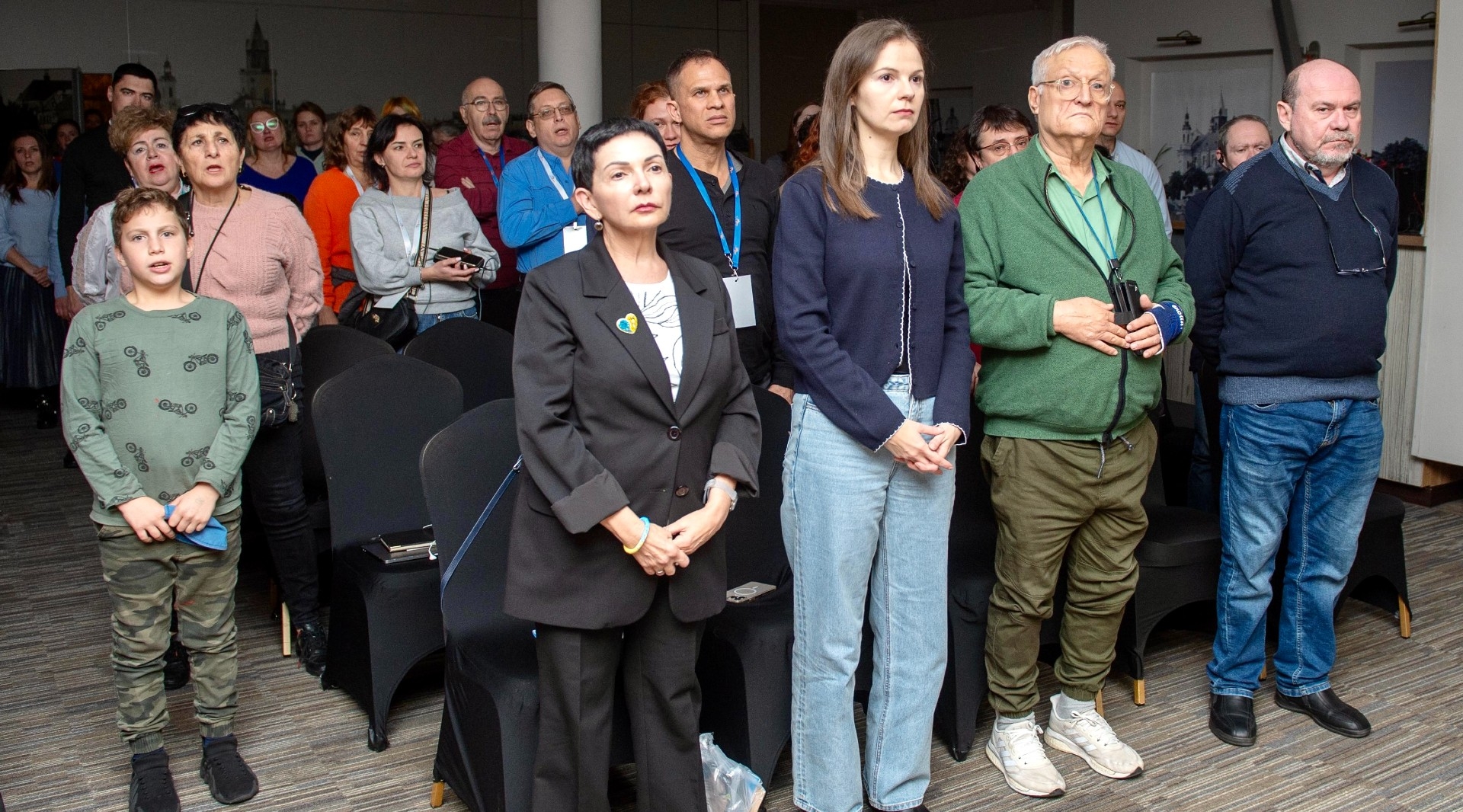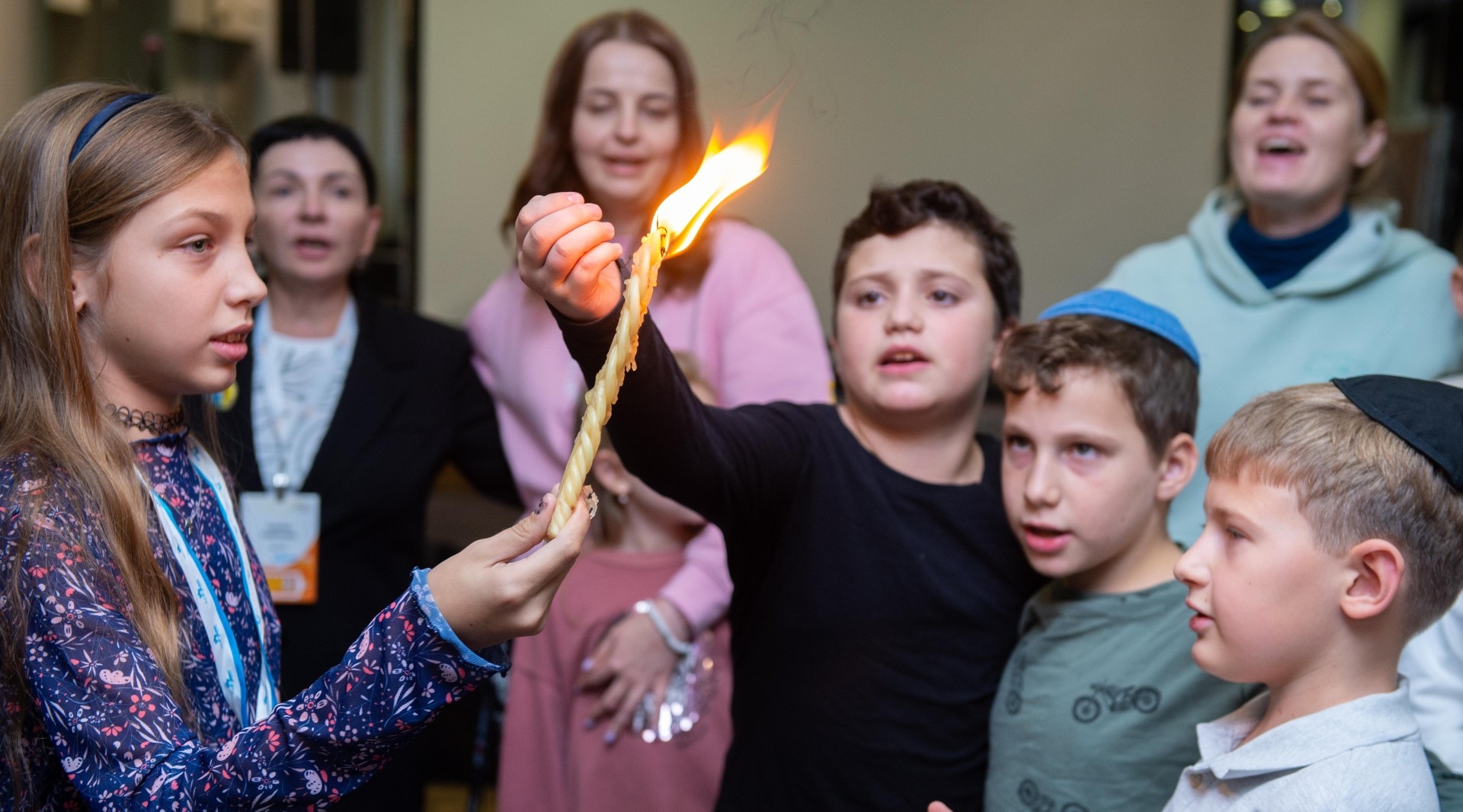LUBLIN, Poland – With wars raging in Ukraine and Israel, many Ukrainian Jews feel doubly traumatized by the troubles roiling their native country and the Jewish homeland.
So when over 150 Ukrainian Jews gathered over a recent weekend in Poland for a three-day event hosted by Limmud FSU, the nonprofit organization founded by Israeli Chaim Chesler and American Sandra Cahn that seeks to foster Jewish identity and community among Jews from the former Soviet Union, the event served as an occasion for a welcome respite during difficult times.
Most of those who attended the Nov. 3-5 event traveled overland from Ukraine. The rest came from elsewhere in Poland as well as from the Netherlands, Germany and Israel.
The symbolism of hosting the Jewish event for Ukrainian Jews in Lublin, which for centuries before the Holocaust had been a thriving center of Jewish life and is located only 60 miles from the Ukraine border, was unmistakable.
“Since we couldn’t hold the conference in Ukraine we decided to do it in the very unique Jewish city of Lublin, with its huge yeshiva that was destroyed by the Nazis in 1939 and rebuilt only 10 years ago,” said Chesler. “We are here with our brothers and sisters from Ukraine, who are experiencing the same hardship that we now endure in Israel.”
For three days, the festival turned Lublin’s Hotel Victoria into a hub of Jewish learning, music, dance, games, food and joy.
“Two of the things I love most are history and Jewish culture,” said software developer Artem Linnyk, 30, a Ukrainian native who has lived in Poland for the last eight years. “Limmud is a great place to find both.”
Natalia Tolok, a tour guide and Hillel director in the Ukrainian city of Lviv, came to present a session on her favorite hobby: traditional Jewish dance.
“Limmud is not just a conference. This is a big family, a kind of separate Jewish world that embraces anyone related to Jewishness,” Tolok said. “We used to have huge Limmuds in Lviv and Odessa with hundreds of people. But right now not all who love Limmud can come, for various reasons. They are spread around the world, or in some cases they cannot leave Ukraine.”
Welcomed by Poland’s King Casimir in 1336, Jews comprised nearly half of Lublin’s population before World War II. Most were murdered during the Holocaust, and although only a few dozen Jews remain here today, reminders of the city’s glorious and painful Jewish past are everywhere.

Julietta Golovan displays her Ukraine shawl during a musical performance by Polish singer-songwriter Vladimir Svatyov, at the Limmud FSU event for Ukrainian Jews in Lublin, Poland, Nov. 3-5, 2023. (Larry Luxner)
A bronze plaque at the city’s main shopping center, Lublin Mall, commemorates the site of Lipowa 7, a forced labor camp where Nazi officers executed about 700 Jewish prisoners on Nov. 3, 1943. Limmud participants visited a restored yeshiva and synagogue, the Old Jewish Cemetery dating back to 1541, and the Nazi concentration camp site of Majdanek where over 80,000 Jews were killed.
“In these trying times for both the State of Israel and Ukrainian Jews, our event in Lublin stands as a testament to the resilience and unity we share,” said Matthew Bronfman, chairman of Limmud FSU. “As we convene in this historic city, we renew our steadfast support for one another, transcending the distances that separate us with a shared bond of solidarity.”
War has become a part of life for many of Ukraine’s Jews today. Photographer Boris Bukhman, a 62-year-old from Odessa, displayed 15 photos from an exhibit of his about the Russia-Ukraine war.
“We understand what’s going on in Israel just as Israelis understand pretty well what’s going on in Ukraine,” said Bukhman, who has documented battlefield amputations of soldiers. “I was asked not to bring my harshest photos of the war here, so people wouldn’t be traumatized all over again.”
Alexei Podorozhnyy, a Ukrainian currently living in Germany, has fled war twice: first eight years ago to Kyiv, and then to Frankfurt, where he has resided since the Russian invasion.
“I was so glad to see my friends from Ukraine at this event,” Podorozhnyy said in Lublin.
Since its creation in 2005 to strengthen Jewish connections and identity among Jews with roots in the former Soviet Union, Limmud FSU has held 85 festivals around the globe that have drawn more than 80,000 participants overall. Its work is supported by individuals and organizations around the world, including the Conference on Jewish Material Claims against Germany, Nativ-Israeli Prime Minister’s Office, World Zionist Organization, Jewish National Fund – KKL, American Jewish Joint Distribution Committee, Wilf Family Foundation, Dutch Jewish Humanitarian Fund, Diane Wohl, Bill Hess and others.

The Israeli and Ukrainian national anthems were played during the closing event of the Limmud FSU event for Ukrainian Jews in Lublin, Poland, Nov. 5, 2023. (Boris Bukhman)
In her welcome message, Raheli Baratz-Rix, head of the World Zionist Organization’s Department for Combating Antisemitism and Enhancing Resilience, urged participants not to remain silent in the face of surging global antisemitism.
“Israel is under attack. It’s not just a phrase; it’s our reality right now,” Baratz-Rix said. “All around the world, we’ve seen a 500% increase in antisemitism since the war began — in Great Britain, Germany, France, the United States and Canada, as well as in the former Soviet Union. We need you by our side, more than ever, to fight together for the narrative. Israel is a strong country and will win, but no one can stay silent right now.”
Alex Mershon, director of Nativ’s Department of Culture and Education, said, “It is important to emphasize that the Limmud in Lublin is not just a prominent educational event but also a tangible demonstration of solidarity by Jewish communities in former Soviet Union countries with the State of Israel. At Nativ, we actively participate in this important project, particularly during these challenging times for the Jewish people in Israel and the Diaspora.”
Shlomo Voskoboynik, 56, is originally from Malin, a small town near Kyiv. He immigrated to Israel in 1994 and now works as an emissary in Estonia for Israel’s Education Ministry. At the Limmud in Lublin he led Kabbalat Shabbat prayers, explained the week’s Torah portion and led sessions on Jewish culture.
“This Limmud was less cerebral and more emotional,” Voskoboynik said. “We know that many presenters couldn’t come, but the feeling was very strong. There’s a war in Ukraine, there’s also a war in Israel now, and people want to feel united.”
This sentiment was especially evident at the closing ceremony, when the national anthems of Ukraine and Israel were played one after the other. Despite the challenges, participants said they were hopeful that the security situation in Ukraine is improving — especially in Kyiv, where life seems to be gradually returning to normal.
“Hopefully next year we can do this conference in Ukraine,” said Natasha Chechik, Limmud FSU’s Israeli executive director. “This is one of our main goals for 2024: bringing Limmud back to Ukraine.”
JTA has documented Jewish history in real-time for over a century. Keep our journalism strong by joining us in supporting independent, award-winning reporting.
This article was sponsored by and produced in partnership with Limmud FSU, which nurtures open, pluralistic, dynamic learning platforms across the world for Jews of all ages and backgrounds with roots in the former Soviet Union, while embracing the Jewish intellectual, cultural and religious traditions grounded in this shared experience. This article was produced by JTA’s native content team.
More from Limmud FSU





